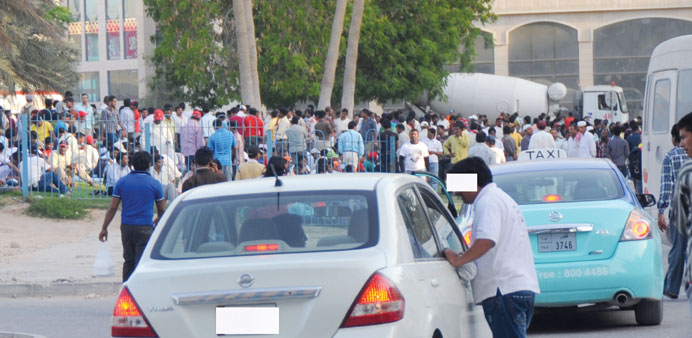By Ayman Adly
The number of illegal taxis operating in the country has increased amid attempts by regular Qatar-based taxi franchises to add more cab units and meet the growing need for additional public transportation.
Many of the operators of these illegal taxis seem to have relocated to Qatar from other GCC countries.
A significant number of expatriates, in fact, prefer the services of unauthorised private vehicles to those of regular taxis.
An Asian driver, who expressed his views to this paper, lamented over the failure of his car rental business in Dubai, which prompted him to seek employment in Qatar.
He found job opportunities in Doha “better” and described Qatar’s economy as having a “bright future” due to the state’s infrastructure upgrade and construction boom.
This, according to him, has set a trend among young Arab and Asians to work as operators or drivers of unauthorised taxis. It is generally considered “risky” by the operators and drivers who readily admit that their “business” is illegal.
Another driver revealed that the risks involved in operating an illegal taxi had taught him to be selective when choosing potential customers.
He said drivers of illegal taxis usually preferred to carry families, women, or lone passengers rather than picking up customers in key thoroughfares or shopping malls.
“Another strategy is to cautiously wait at the arrival area of the Doha International Airport,” yet another driver said.
An Arab expatriate, who is a frequent taxi user because of his failure to obtain a driver’s licence, explained that passengers preferred illegal taxis to legal ones because of several factors: “The fare rates of private vehicles are negotiable because they don’t have taxi meters. Also, you can request to be picked up at a preferred time and location.”
He said: “A customer can get the number of the driver and schedule trips, most especially if the passenger is satisfied with the services of the private vehicle.”
A taxi driver from one of the authorised franchises, who asked not to be named, said some drivers tampered with the car’s meter by programming it to charge at a faster rate.
He stressed that a taxi meter should only be set to “1” if the destination was within city limits. “But if the passenger’s destination is outside Doha city, the taxi metre will be set to ‘0’ , which charges a rate faster than the regular time.”
He said that some taxi drivers tampered the meter by setting it to “0” but they would cover or draw over the zero to make it look like a “1”. Unknown to the passenger, the metre would be running or charging at a faster rate even if the route was within Doha city limits, the taxi driver said.
An elderly Asian driver ferrying a 2014 model sedan said private taxis were usually rented units. He said he was forced into the “business” since the demolition of the property that housed his grocery business.
At the Doha Industrial Area, older models are also used as taxis but on a “carpool” basis.
A labourer at the Industrial Area claimed that carpooling was a practical method for most commuters costing around QR5 per passenger, which is cheaper and faster than waiting for the bus or a regular taxi.
He added that he agreed with calls from many regular commuters to provide the public with more transportation options.

